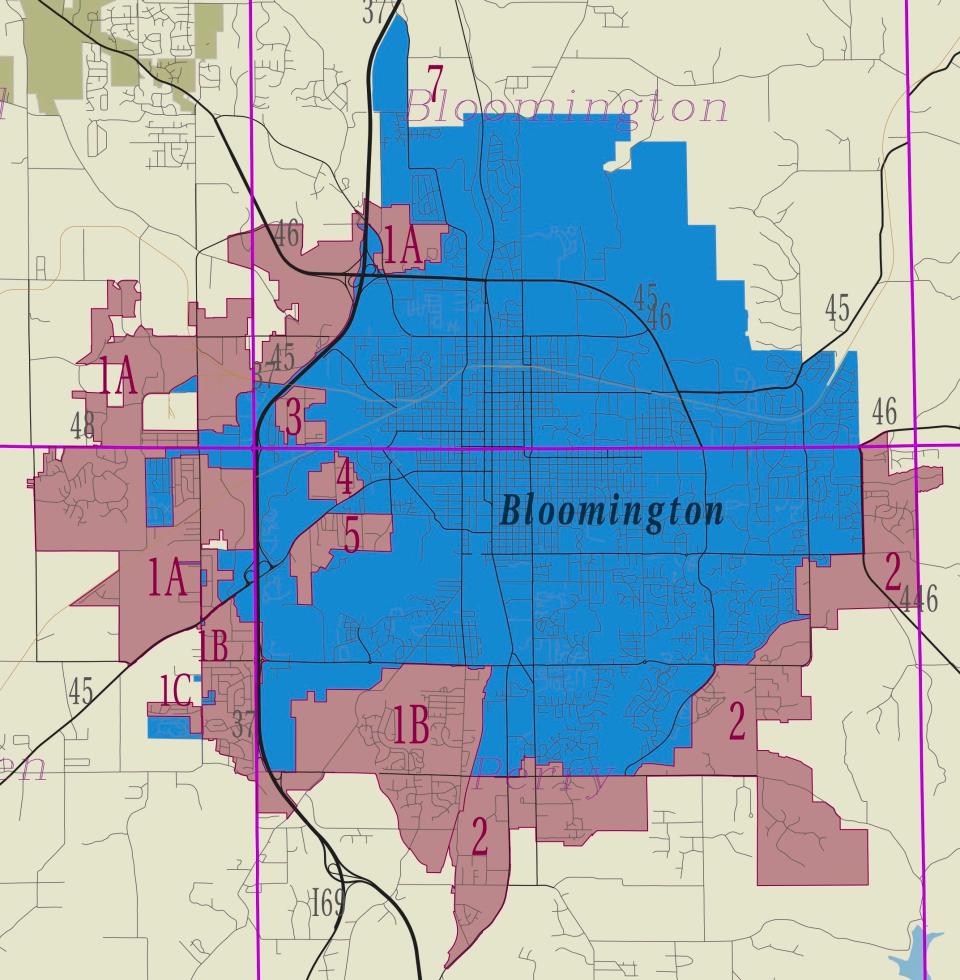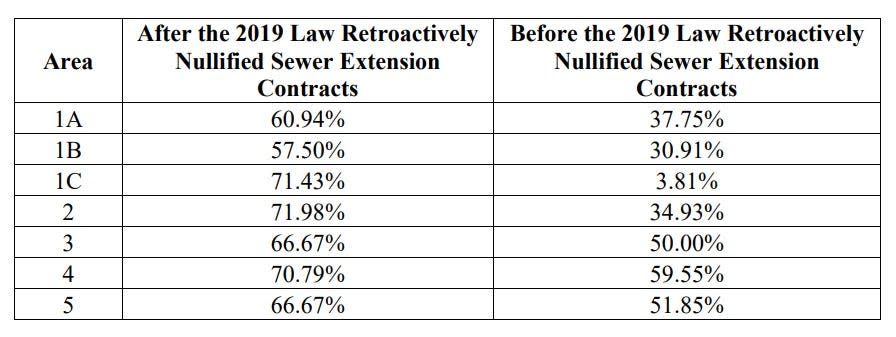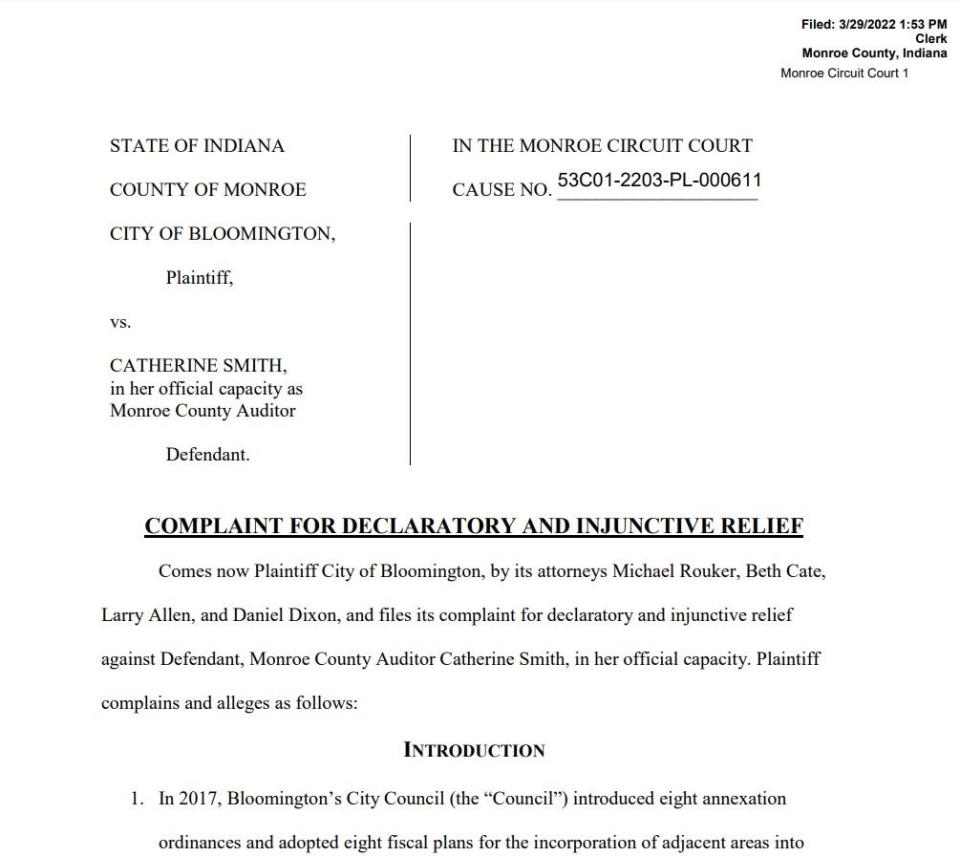Bloomington challenging 2019 state law that let more property owners fight annexation
The city of Bloomington is again going to fight the state over annexation, saying a 2019 law passed by the state Legislature violates the state and federal constitutions.
The city on Tuesday filed a lawsuit in Monroe Circuit Court to challenge the law, which greatly impeded the city’s annexation attempt.
“We are prepared to go back to court against the General Assembly’s continued, persistent interference with our local process,” Bloomington Mayor John Hamilton said.

The suit touches on property rights, contract law and the balance between municipal and state powers. Its outcome could have repercussions across the state.
The suit alleges, among other things, that the 2019 law violates constitutional prohibitions against enacting legislation that retroactively alters valid contracts.
Rejected: Bloomington annexation fails in 5 of 7 areas
Last year Hamilton renewed the city's 2017 annexation attempt. After revisions, the proposal sought to move about 8,200 acres and 14,300 residents in seven unincorporated areas of the county inside new city limits. The city’s population would have swelled near 100,000, and the city’s land area would have increased by about 54%.
However, residents in those areas had three months at the end of last year and the start of 2022 to formally oppose the annexation plan by filing remonstrance petitions — so long as their property did not have a remonstrance waiver attached to it.
Hamilton said the proposal aimed to “right-size” the city, which has not expanded its boundaries since 2004, despite significant growth around it. Many residents in the annexation areas said they did not want to pay higher property taxes for few, if any, services they would find useful.

Residents in the annexation areas expressed overwhelming opposition to the annexation attempt and filed enough remonstrances to stop the mayor’s proposal outright in five of seven areas.
However, many of the opponents were allowed to file such petitions only because of House Enrolled Act 1427, the 2019 law the city is challenging.

The law voids remonstrance waivers, which prohibit property owners from fighting a future annexation, that are more than 15 years old. Property owners just outside a city usually sign such waivers in return for the city providing them with water and/or sewer service.
The city said Tuesday that the law “retroactively voided 80% of Bloomington’s sewer extension contracts.”
Unconstitutional: State's high court rules in Bloomington's favor on annexation
The city argues people signed those waivers in return for the city providing a service, and after the city has fulfilled its part of the bargain the state jumped in and said the property owners no longer have to hold up their end.
“Like nearly every state in the country, Indiana’s Constitution contains a contracts clause that prohibits its Legislature from enacting laws that retroactively alter independently negotiated contracts,” a city press release said. That action also “violates Article I, Section 10 of the federal Constitution, which also prohibits the legislative branch from interfering with pre-existing contracts.”
The city has filed its suit against Monroe County Auditor Catherine Smith, because she was the local official who certified the remonstrances.
Law passed after start of annexation process
The city also argues that the 2019 law cannot be applied to the city’s annexation attempt because that effort began in 2017 and was delayed solely because of another state law, which the Indiana Supreme Court later determined to be unconstitutional.
“While Bloomington was in the middle of winning this first fight, the Legislature took advantage of the time it bought and interceded again with the 2019 statute, voiding most of Bloomington’s sewer contracts,” the press release said. “The Legislature was only able to use the 2019 law to nullify sewer extension contracts and further hamper Bloomington’s annexation because it unconstitutionally delayed Bloomington’s annexation in 2017.”

The legal concept underlying that argument is called the “unclean hands doctrine,” which stipulates that a party should not derive any benefit if it has acted in bad faith.
Paul Helmke, a lawyer, Indiana University professor and a former Fort Wayne mayor, said the city could argue the state should not be able to stop the annexation with the 2019 law because the state was in a position to do so only because of the unconstitutional action it took in 2017.
Attorneys: Legal battle between Bloomington, state would answer fascinating questions
If not for that, the city’s annexation would have been completed before the 2019 law could apply, Helmke said. Therefore, the 2019 law should not apply, because the state, in this case, has “unclean hands.”
The mayor and the city legal staff were not immediately available for comment late Tuesday afternoon. The city does not generally comment on pending litigation. Julie Thomas, president of the Monroe County Board of Commissioners, also could not be reached Tuesday afternoon. All three commissioners have opposed annexation, in part because it would reduce the county's revenue growth.
Margaret Clements, president of County Residents Against Annexation, said Tuesday she disagrees with the city’s interpretation on the validity of the remonstrance waivers.
In any case, she said, the city should simply listen to the people it is trying to annex.
“The bottom line is, the people are opposed to annexation,” she said.
Another lawsuit — to prevent the city from annexing two areas on its west and southwest sides, where the percentage of remonstrance petitions fell short of an outright defeat of annexation — is pending in Monroe Circuit Court.
Boris Ladwig is the city government reporter for The Herald-Times. Contact him at bladwig@heraldt.com.
This article originally appeared on The Herald-Times: Bloomington challenges state law that undermined annexation attempt

